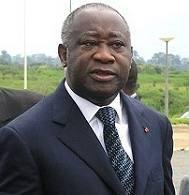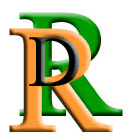
The Politics of Ivory Coast takes place in a framework of a presidential representative democratic republic, whereby the President of Ivory Coast is both head of state and head of government, and of a multi-party system. Executive power is exercised by the President and the Government. Legislative power is vested in both the government and parliament.

Koudou Laurent Gbagbo is an Ivorian politician who was the President of Côte d'Ivoire from 2000 until his arrest in April 2011. A historian, Gbagbo was imprisoned in the early 1970s and again in the early 1990s, and he lived in exile in France during much of the 1980s as a result of his union activism. Gbagbo founded the Ivorian Popular Front (FPI) in 1982 and ran unsuccessfully for president against Félix Houphouët-Boigny at the start of multi-party politics in 1990. He won a seat in the National Assembly of Côte d'Ivoire in 1990.

The First Ivorian Civil War was a conflict in the Ivory Coast that began in 2002. Although most of the fighting ended by late 2004, the country remained split in two, with a rebel-held north and a government-held south. Hostility increased and raids on foreign troops and civilians rose. As of 2006, the region was tense, and many said the UN and the French military failed to calm the civil war.

Romain Francis Wodié is an Ivorian politician. A professor and human rights activist, he led the Ivorian Workers' Party (PIT) from 1990 to 2011. During that time, Wodié served as a Deputy in the National Assembly of Côte d'Ivoire from 1990 to 1995 and as Minister of Higher Education from 1998 to 1999. He was President of the Constitutional Council of Côte d'Ivoire from 2011 to 2015.

Guillaume Kigbafori Soro is an Ivorian politician who was the Prime Minister of Côte d'Ivoire from April 2007 to March 2012. Prior to his service as Prime Minister, Soro led the Patriotic Movement of Côte d'Ivoire, and later the New Forces as its Secretary-General. Since March 2012, Soro has been President of the National Assembly of Côte d'Ivoire.

Presidential elections were held in Ivory Coast in 2010. The first round was held on 31 October, and a second round, in which President Laurent Gbagbo faced opposition leader Alassane Ouattara, was held on 28 November 2010. Originally scheduled to be held in 2005, the vote was delayed several times due to the Ivorian Civil War and difficulties involved in the organization and preparation of the elections. A peace agreement between the government and the former rebel New Forces was signed on 4 March 2007, and in late April 2009, it was announced that the elections would be held by 6 December 2009, and that the date would be announced shortly. On 15 May 2009, the date was announced to be 29 November 2009. On 11 November, the elections were postponed again due to delays in the electoral roll. It was announced on 3 December 2009 to be held in late February or early March 2010.

A parliamentary election was held in Ivory Coast on 11 December 2011, after the presidential election which was held in late 2010. This followed a peace agreement between the government and the New Forces that was signed in March 2007. The Rally of the Republicans, the party of President Alassane Ouattara, won just under half the seats in the National Assembly.
The 1999 Ivorian coup d'état took place on December 24, 1999. It was the first coup d'état since the independence of Ivory Coast and led to the President Henri Konan Bédié being deposed.

The Constitution of Ivory Coast was approved by referendum on October 30, 2016 and officially adopted on November 8, 2016.

A constitutional referendum was held in Ivory Coast on 23 and 24 July 2000. The changes to the constitution would require both parents of presidential candidates to have been born in the country. as well as giving immunity from prosecution from those involved in the coup the previous year. It was approved by 86.53% of voters with a 56% turnout.

The 2010–11 Ivorian crisis was a political crisis in Ivory Coast which began after Laurent Gbagbo, the President of Ivory Coast since 2000, was proclaimed the winner of the Ivorian election of 2010, the first election in the country in 10 years. The opposition candidate, Alassane Ouattara, and a number of countries, organisations and leaders worldwide claimed Ouattara had won the election. After months of attempted negotiation and sporadic violence, the crisis entered a decisive stage as Ouattara's forces began a military offensive in which they quickly gained control of most of the country and besieged key targets in Abidjan, the country's largest city. International organizations have reported numerous human rights violations, and the UN undertook its own military action with the stated objective to protect itself and civilians.

The Second Ivorian Civil War broke out in March 2011 when the crisis in Ivory Coast escalated into full-scale military conflict between forces loyal to Laurent Gbagbo, the President of Ivory Coast since 2000, and supporters of the internationally recognised president-elect Alassane Ouattara. After months of unsuccessful negotiations and sporadic violence between supporters of the two sides, the crisis entered a critical stage as Ouattara's forces seized control of most of the country with the help of the UNO, with Gbagbo entrenched in Abidjan, the country's largest city. International organizations have reported numerous instances of human rights violations by both sides, in particular in the city of Duékoué where Ouattara's forces killed hundreds of people. Overall casualties of the war are estimated around 3000. The UN and French forces took military action, with the stated objective to protect their forces and civilians. France's forces arrested Gbagbo at his residence on 11 April 2011.

The Parliament of Ivory Coast is the legislature of Ivory Coast. From 1960 to 2016, it was a unicameral body. It became a bicameral body after a new constitution was approved by referendum on October 30, 2016. The parliament will consists of two chambers:
The following lists events that happened during 2010 in Ivory Coast.
The following lists events that happened during 2011 in Ivory Coast.
The Constitutional Council is a judicial body in the government of Ivory Coast that is patterned after the Constitutional Council of France. The Council was created by law in 1994 and began its operations in 1995. The seat of the Council is in Abidjan.

The Senate is the upper house of the Parliament of Ivory Coast. The Senate was created after a new constitution was approved by a referendum in 2016.

The Vice President of the Republic of Ivory Coast, officially the Republic of Côte d'Ivoire, is the second-highest executive official in Ivory Coast. The Vice President, together with the President of Ivory Coast, is directly elected by the people through popular vote to serve a five-year term of office. The Vice President is the first person in the presidential line of succession and would ascend to the presidency upon the death or resignation of the President, or an absolute vacancy in the office. President Alassane Ouattara appointed Daniel Kablan Duncan as Vice President in January 2017 after the 2016 Constitution was enacted.














